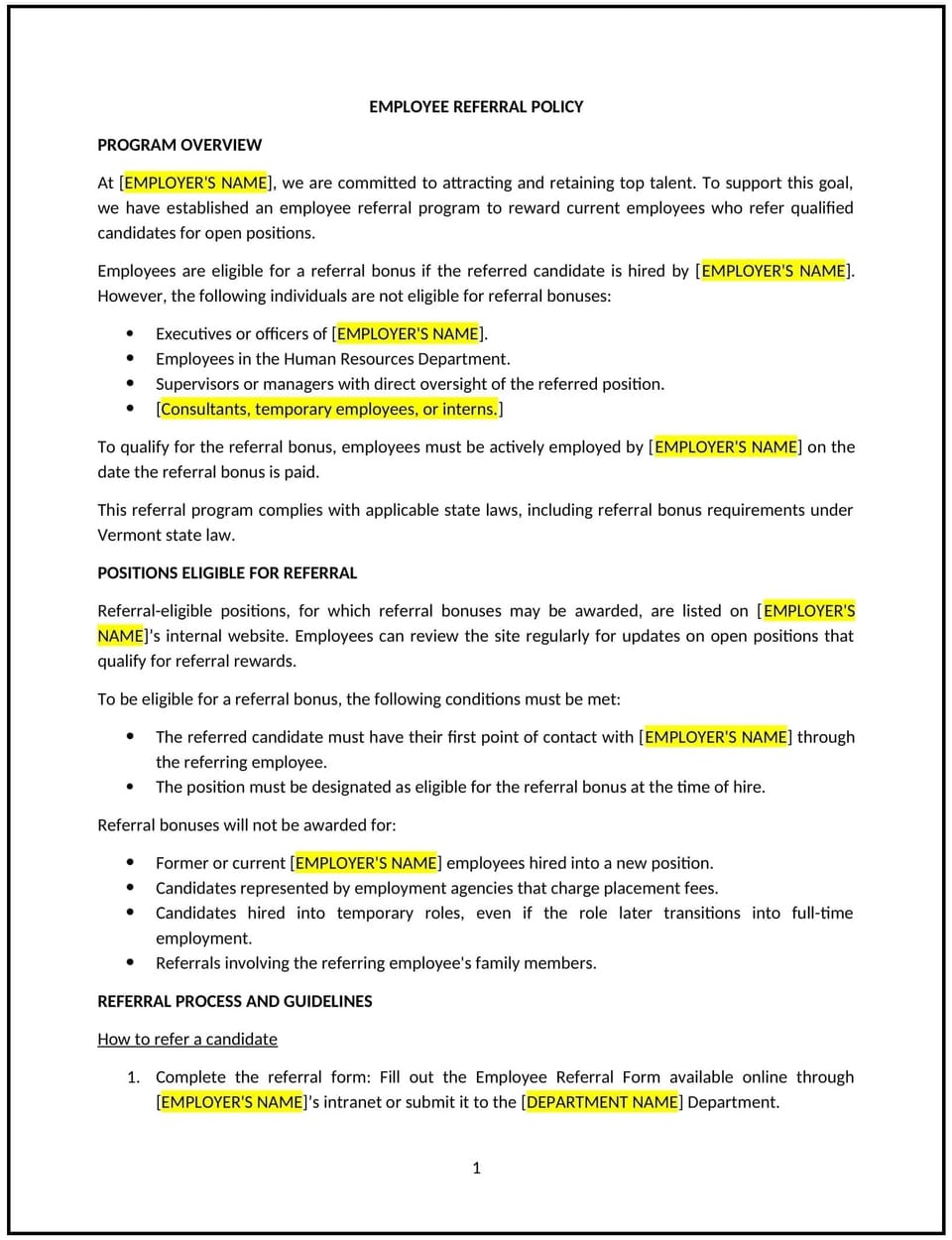Employee referral policy (Vermont): Free template

Employee referral policy (Vermont)
This employee referral policy is designed to help Vermont businesses encourage employees to recommend qualified candidates for open positions. It outlines guidelines for submitting referrals, eligibility for rewards, and criteria for evaluating referred candidates, ensuring a transparent and fair process.
By adopting this policy, businesses can expand their talent pool, engage employees in recruitment efforts, and enhance hiring efficiency.
How to use this employee referral policy (Vermont)
- Define referral eligibility: Specify which employees are eligible to participate in the referral program and any restrictions (e.g., HR staff or managers of referred candidates).
- Clarify referral process: Provide instructions for submitting referrals, including required information such as the candidate’s resume and relationship to the referrer.
- Set reward criteria: Outline the rewards for successful referrals, such as monetary bonuses, gift cards, or additional paid time off, and define when rewards are issued (e.g., after a probationary period).
- Include candidate evaluation: Emphasize that referred candidates must meet the company’s qualifications and undergo the standard hiring process.
- Address tax implications: Inform employees of any tax responsibilities associated with referral rewards.
- Promote fairness: Ensure all candidates are evaluated objectively, regardless of their referral status.
- Monitor compliance: Regularly review the program to ensure it aligns with Vermont laws and workplace policies.
Benefits of using this employee referral policy (Vermont)
This policy provides several benefits for Vermont businesses:
- Expands talent pool: Leverages employees’ networks to identify qualified candidates quickly.
- Enhances employee engagement: Involves employees in the recruitment process, fostering a sense of contribution.
- Reduces hiring costs: Saves on recruitment expenses by utilizing internal recommendations.
- Promotes cultural fit: Encourages referrals from employees who understand the company’s values and work environment.
- Supports compliance: Aligns with Vermont employment laws and ensures fairness in hiring practices.
Tips for using this employee referral policy (Vermont)
- Communicate the policy: Share the policy with all employees and include it in onboarding materials or the employee handbook.
- Offer attractive rewards: Ensure the referral rewards are meaningful and motivate employees to participate.
- Track referrals: Maintain a record of referrals, including the referring employee, candidate details, and hiring outcomes.
- Provide feedback: Notify employees of the status of their referrals to encourage ongoing participation.
- Update regularly: Revise the policy to reflect changes in Vermont laws, hiring practices, or organizational goals.
Q: Who is eligible to participate in the referral program?
A: All employees are eligible, except for those involved in the hiring process for referred candidates, such as HR staff or hiring managers.
Q: How should employees submit referrals?
A: Employees can submit referrals by providing the candidate’s resume and contact details to HR, along with a brief description of their relationship.
Q: When are referral rewards issued?
A: Rewards are issued after the referred candidate completes a specified period of employment, such as the probationary period, as defined in the policy.
Q: Are there limits to the number of referrals an employee can make?
A: No, employees are encouraged to refer as many qualified candidates as possible, provided each candidate meets the company’s hiring criteria.
Q: What types of rewards are offered?
A: Rewards may include monetary bonuses, gift cards, or additional paid time off, depending on the company’s policy.
Q: Are referred candidates guaranteed a job?
A: No, referred candidates must meet the qualifications for the position and successfully complete the hiring process.
Q: How often is this policy reviewed?
A: This policy is reviewed annually or whenever significant changes occur in Vermont laws or workplace practices.
Q: Are referral rewards subject to taxes?
A: Yes, referral rewards are considered taxable income, and employees are responsible for any associated tax obligations.
This article contains general legal information and does not contain legal advice. Cobrief is not a law firm or a substitute for an attorney or law firm. The law is complex and changes often. For legal advice, please ask a lawyer.


